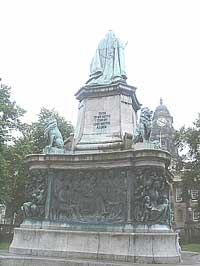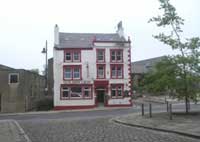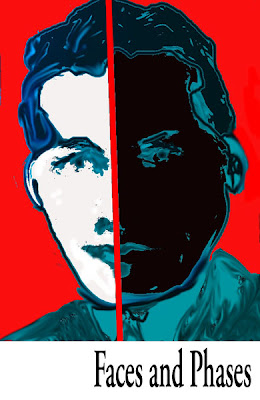"Hurrah!" said Michael.
"Oh no you don't!" retorted Margaret. "I've the baby to see to most of the time. I think you should have your share at weekends."
It was out of the question that he should be seen pushing a pram, in the town, so he couldn't take Gwyn. Pushing prams was a woman's job. On the other hand, he didn't want a row because he was hoping for a bit of loving that evening.
"Tell you what, we'll let Gwyn have a bit more sleep," he suggested, trying to find a solution to his wife's demands, "then how about us all going to see your mum and dad at Torrisholme? You can take some of our joint of beef with us and Grandma will soon find some extra vegetables for us, won't she Michael?"
Margaret's face brightened at the prospect and Michael shouted out with glee, loud enough to wake the baby up, which meant they could get ready right away.
 |
| Where St. Annes Church used to be today |
Their house was on the end of Edward Street. They crossed the road and walked down Moor Lane, past Riley's, the grocer's shop window. It was nearly 11 o'clock and the town's church bells were ringing. On the opposite side of Moor Lane was St. Anne's Church, where Michael was soon to start Sunday School. A few people were just going in.
The bells of the Roman Catholic Cathedral of St. Peter, not far from the top of Moor Lane, could be heard, while the ringers at St. Mary's, near Lancaster Castle, were competing well. Michael thought they all sounded lovely.
Further down Moor Lane there was a variety of shops, including the newsagents. Gordon did not usually take an evening paper but since Dr. Ruxton's arrest for murder, in October, he'd been stopping there every day on his way home, to buy the local edition of the Lancashire Evening News. It was printing all the gory details as they unfolded during the investigation, arrest, police court appearances and trial of the accused man.
This Sunday morning, the newsagents excepted, all of the shops, including Riley's, were closed and the only people about were churchgoers. Everybody, apart from those who couldn't afford any, were wearing their best clothes, which they only wore on Sundays or for other very special occasions. It would be the same when the pubs opened. The men would go there in their Sunday outfits. In the afternoon, people going to take flowers to their dead in the cemeteries, or out for a relaxing walk, would wear their best attire. Indoors, many would put on their glad rags, in case they had visitors.
Usually, Margaret worked all morning making Sunday dinner, but after she had washed up she'd say to Gordon, handing him the baby, "Here love, look after her a minute, I'm just going up to change."
Half an hour later, she'd come back down in a nice, new frock she'd made for herself. She'd brushed her dark hair, rubbed in some face cream, powdered her cheeks and smeared a hint of lipstick onto her mouth.
 |
| Queen Victoria statue, Dalton Square, Lancaster |
"How'd I look?" she'd giggle, pleased with her transformation. Once, Gordon put the baby down on the rug in front of the fire, took his wife in his arms and swung her round off her feet. Then he sat down with her on his lap and tickled her knees. That made her giggle a lot more.
"Stop it, Dad! You're hurting her. She doesn't like it," cried Sir Galahad, in the guise of Michael.
Margaret struggled free, stood up and smoothed herself down.
"I'll deal with you later," laughed Gordon. Michael did not understand what he meant by that. As his mother giggled again, he didn't worry.
Just before they turned left out of Moor Lane and passed the turning to Bulk Street, Gordon paused and took a deep breath. "Lovely!" he exclaimed.
He was referring to the smell of beer coming from Mitchell's, down Brewery Lane.
"Revolting more like it!" responded Margaret. Michael didn't like it either. Depending on which way the wind was blowing, he could sometimes smell it when he was lying in bed. He didn't like it at all. He agreed with his mother, it was revolting.
They went past where the shire horses were kept just round the next turning. They carried on up the slope and onto Dalton Square. The clock, on the far side of the Square, on top of the imposing Ashton Hall, was showing eleven and a bus for Morecambe was just leaving. It would be half an hour before the next one.
Margaret blamed her husband. "If you hadn't stopped to act the fool, sniffing that beer, we'd have been just right."
Gordon put on a brave face.
"Never mind love, it's not cold. We can go and sit in the park and Michael can have a run around in there."
Margaret handed over the baby, "Here, you take her, she's getting heavy."
Then she led the way into the little Park, in the middle of the Square, the one where the huge statue of little Queen Victoria was situated. It dominated everyone and everything she surveyed from the top of her plinth. People were sitting on the seats at the side of the circular path and there were a few weary blossoms still flowering in the flower beds.
It being such a nice morning, for December, most of the bench seats were occupied but a fat woman in a black hat and a thin man in a brown one moved up to let Margaret and Gordon sit down. Michael went to play on the steps around Queen Victoria's statue. Margaret was staring at the tall house, next to the County Cinema, on the side of the Square, facing the Ashton Hall.
"I feel sorry for him," she said, "I really do." She didn't have to explain who she meant. It was Buck Ruxton's house she was looking at.
"I know what you mean love," agreed Gordon, "knowing him like we do. I must say I feel a bit guilty that I didn't take more notice when I saw him having a go at her last year when you were having Gwyn."
"Don't be silly! It's not for us to tell doctors how to behave."
Three other local people, waiting there for the bus, started to join in the conversation and discuss the recent murder of the doctor's wife and his housemaid.
Many folk had a story to tell about the Ruxtons. Gordon told his to the couple sitting next to him.
"I don't think he was going to hurt her with the knife I saw," concluded Gordon. "I think I'd probably disturbed him at his supper."
"Bit late to be having his supper, wasn't it?" said the thin man.
"Lucky he didn't make a real meal of her there and then from what you've just told us," observed the fat woman.
Nobody laughed.
"He was driven to it, she was a wrong 'un."
"Aye, but he shouldn't have hurt the housemaid."
"True!"
"They'll hang him, they've said they will."
"Serve him right!"
"I don't agree with that."
 |
| The Golden Lion, Moor Lane |
Many remembered his kindness. Nothing too much trouble for his patients, in a mainly low-paid, working-class area. His fees were modest and he refused any payment from destitute sick people. It was a real tragedy all round.
"But he shouldn't have harmed the girl!" said the fat woman. And for many, that settled the matter: he deserved to hang.

No comments:
Post a Comment